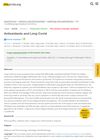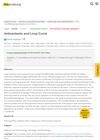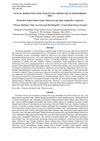 49 citations,
October 2009 in “Cancer research”
49 citations,
October 2009 in “Cancer research” Disrupting Stat3 in hair follicle stem cells greatly reduces skin tumor formation.
 August 2023 in “International Ayurvedic medical journal”
August 2023 in “International Ayurvedic medical journal” Ayurvedic treatment successfully regrew hair in a 7-year-old girl with alopecia areata.

Inhibiting AP-1 changes skin tumor types and affects tumor cell identity.

Inhibiting AP-1 changes skin tumor types and affects tumor cell identity.
 August 2024 in “Nutrition Bulletin”
August 2024 in “Nutrition Bulletin” GLP-1 receptor agonists help with weight loss but need to be combined with other treatments for best results.
 February 2024 in “Advanced Science”
February 2024 in “Advanced Science” The new scaffold with two growth factors speeds up skin healing and reduces scarring.
 1 citations,
October 2022
1 citations,
October 2022 Antioxidants might help manage Long Covid by addressing oxidative stress and nutrient imbalances.
 1 citations,
October 2022
1 citations,
October 2022 The conclusion suggests that managing antioxidant levels and the calcium to magnesium ratio may help address Long Covid and related chronic fatigue conditions.

Self-monitoring blood pressure in pregnant women didn't improve outcomes, diabetes drugs may increase gallbladder disease risk, a new drug helps severe hair loss, a plant-based COVID-19 vaccine is 69.5% effective, and new anticoagulants are safer for diabetics with heart rhythm issues than warfarin.
 8 citations,
March 2020 in “Frontiers in Cell and Developmental Biology”
8 citations,
March 2020 in “Frontiers in Cell and Developmental Biology” Researchers created immortal human skin cells with constant testosterone receptor activity to study hair loss and test treatments.
 1 citations,
August 2023 in “Frontiers in immunology”
1 citations,
August 2023 in “Frontiers in immunology” Traditional Chinese medicinal foods may help manage long-term post-COVID symptoms.
 1 citations,
September 2017 in “Journal of Investigative Dermatology”
1 citations,
September 2017 in “Journal of Investigative Dermatology” Blocking a specific enzyme can reduce the negative impact of stress hormones on hair growth cells.
 January 2024 in “Jurnal Ilmu Kesehatan Hewan”
January 2024 in “Jurnal Ilmu Kesehatan Hewan” A mixed breed dog with skin issues improved significantly after treatment and needs to avoid dampness and certain bath products to prevent it from coming back.
 September 2017 in “Journal of Investigative Dermatology”
September 2017 in “Journal of Investigative Dermatology” The Siah1 and Siah2 genes are active in mouse skin development and hair growth, especially right after birth.
 September 2017 in “Journal of Investigative Dermatology”
September 2017 in “Journal of Investigative Dermatology” Certain miRNAs might be involved in a hair loss condition called frontal fibrosing alopecia and could possibly help in its diagnosis.
 September 2017 in “Journal of Investigative Dermatology”
September 2017 in “Journal of Investigative Dermatology” The study found that sweat glands normally suppress immune responses, but this is disrupted in certain skin diseases, possibly contributing to their development.
 September 2017 in “Journal of Investigative Dermatology”
September 2017 in “Journal of Investigative Dermatology” Researchers created human cells that can turn into sebocytes, which may help study and treat skin conditions like acne.
 January 2015 in “Elsevier eBooks”
January 2015 in “Elsevier eBooks” Nanocarriers like liposomes and cyclodextrins improve how angiotensin-(1-7) is delivered in the body.
 September 2017 in “Journal of Investigative Dermatology”
September 2017 in “Journal of Investigative Dermatology” Finasteride helps female-pattern hair loss.
 May 2004 in “Pediatric Dermatology”
May 2004 in “Pediatric Dermatology” Atopic dermatitis may have genetic causes and can be treated with pharmacologic methods, glycerin creams, and controlling Staphylococcus aureus colonization.
 184 citations,
October 2007 in “Proceedings of the National Academy of Sciences of the United States of America”
184 citations,
October 2007 in “Proceedings of the National Academy of Sciences of the United States of America” Sulforaphane from broccoli can help protect skin from sun damage.
 71 citations,
May 2007 in “The FASEB journal”
71 citations,
May 2007 in “The FASEB journal” Human hair follicles produce and respond to erythropoietin, helping protect against stress.
 68 citations,
September 2018 in “Trends in Cell Biology”
68 citations,
September 2018 in “Trends in Cell Biology” Cancer can hijack the body's cell repair system to promote tumor growth, and targeting this process may improve cancer treatments.
 66 citations,
December 2013 in “Nature Cell Biology”
66 citations,
December 2013 in “Nature Cell Biology” Inactive hair follicle stem cells help prevent skin cancer.
 27 citations,
November 2013 in “Journal of Dermatological Science”
27 citations,
November 2013 in “Journal of Dermatological Science” The conclusion is that androgenetic alopecia and senescent alopecia have unique gene changes, suggesting different causes and potential treatments for these hair loss types.
 22 citations,
November 2014 in “Psychiatric Clinics of North America”
22 citations,
November 2014 in “Psychiatric Clinics of North America” Stress can worsen skin conditions and affect mental health, so doctors should include stress management in skin treatment.
 16 citations,
January 2012 in “European Journal of Endocrinology”
16 citations,
January 2012 in “European Journal of Endocrinology” The study suggests certain ACE gene variations are more common in women with PCOS and may be linked to increased insulin resistance.
 11 citations,
April 2013 in “Journal of Proteomics”
11 citations,
April 2013 in “Journal of Proteomics” Found different proteins in balding and non-balding cells, giving insight into hair loss causes.
 3 citations,
August 2020 in “International Journal of Molecular Sciences”
3 citations,
August 2020 in “International Journal of Molecular Sciences” Blocking Rab27a slows hair growth, while blocking Rab27b encourages it.
 2 citations,
September 2020 in “Schweizer Archiv für Tierheilkunde”
2 citations,
September 2020 in “Schweizer Archiv für Tierheilkunde” Swiss Holstein cattle with curly, short hair carry genes from the Simmental breed.






























